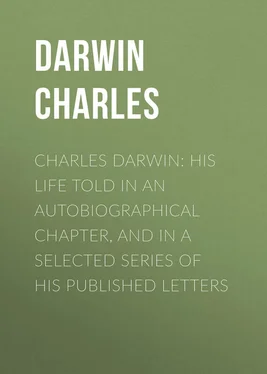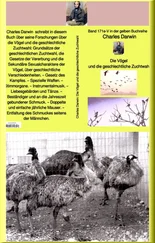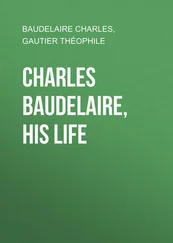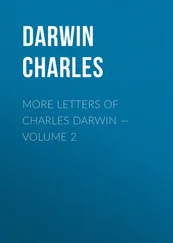Charles Darwin - Charles Darwin - His Life Told in an Autobiographical Chapter, and in a Selected Series of His Published Letters
Здесь есть возможность читать онлайн «Charles Darwin - Charles Darwin - His Life Told in an Autobiographical Chapter, and in a Selected Series of His Published Letters» — ознакомительный отрывок электронной книги совершенно бесплатно, а после прочтения отрывка купить полную версию. В некоторых случаях можно слушать аудио, скачать через торрент в формате fb2 и присутствует краткое содержание. Жанр: foreign_antique, foreign_prose, на английском языке. Описание произведения, (предисловие) а так же отзывы посетителей доступны на портале библиотеки ЛибКат.
- Название:Charles Darwin: His Life Told in an Autobiographical Chapter, and in a Selected Series of His Published Letters
- Автор:
- Жанр:
- Год:неизвестен
- ISBN:нет данных
- Рейтинг книги:5 / 5. Голосов: 1
-
Избранное:Добавить в избранное
- Отзывы:
-
Ваша оценка:
- 100
- 1
- 2
- 3
- 4
- 5
Charles Darwin: His Life Told in an Autobiographical Chapter, and in a Selected Series of His Published Letters: краткое содержание, описание и аннотация
Предлагаем к чтению аннотацию, описание, краткое содержание или предисловие (зависит от того, что написал сам автор книги «Charles Darwin: His Life Told in an Autobiographical Chapter, and in a Selected Series of His Published Letters»). Если вы не нашли необходимую информацию о книге — напишите в комментариях, мы постараемся отыскать её.
Charles Darwin: His Life Told in an Autobiographical Chapter, and in a Selected Series of His Published Letters — читать онлайн ознакомительный отрывок
Ниже представлен текст книги, разбитый по страницам. Система сохранения места последней прочитанной страницы, позволяет с удобством читать онлайн бесплатно книгу «Charles Darwin: His Life Told in an Autobiographical Chapter, and in a Selected Series of His Published Letters», без необходимости каждый раз заново искать на чём Вы остановились. Поставьте закладку, и сможете в любой момент перейти на страницу, на которой закончили чтение.
Интервал:
Закладка:
"Every one who believes, as I do, that all the corporeal and mental organs (excepting those which are neither advantageous nor disadvantageous to the possessor) of all beings have been developed through natural selection, or the survival of the fittest, together with use or habit, will admit that these organs have been formed so that their possessors may compete successfully with other beings, and thus increase in number. Now an animal may be led to pursue that course of action which is most beneficial to the species by suffering, such as pain, hunger, thirst, and fear; or by pleasure, as in eating and drinking, and in the propagation of the species, &c.; or by both means combined, as in the search for food. But pain or suffering of any kind, if long continued, causes depression and lessens the power of action, yet is well adapted to make a creature guard itself against any great or sudden evil. Pleasurable sensations, on the other hand, may be long continued without any depressing effect; on the contrary, they stimulate the whole system to increased action. Hence it has come to pass that most or all sentient beings have been developed in such a manner, through natural selection, that pleasurable sensations serve as their habitual guides. We see this in the pleasure from exertion, even occasionally from great exertion of the body or mind, – in the pleasure of our daily meals, and especially in the pleasure derived from sociability, and from loving our families. The sum of such pleasures as these, which are habitual or frequently recurrent, give, as I can hardly doubt, to most sentient beings an excess of happiness over misery, although many occasionally suffer much. Such suffering is quite compatible with the belief in Natural Selection, which is not perfect in its action, but tends only to render each species as successful as possible in the battle for life with other species, in wonderfully complex and changing circumstances.
"That there is much suffering in the world no one disputes. Some have attempted to explain this with reference to man by imagining that it serves for his moral improvement. But the number of men in the world is as nothing compared with that of all other sentient beings, and they often suffer greatly without any moral improvement. This very old argument from the existence of suffering against the existence of an intelligent First Cause seems to me a strong one; whereas, as just remarked, the presence of much suffering agrees well with the view that all organic beings have been developed through variation and natural selection.
"At the present day the most usual argument for the existence of an intelligent God is drawn from the deep inward conviction and feelings which are experienced by most persons.
"Formerly I was led by feelings such as those just referred to (although I do not think that the religious sentiment was ever strongly developed in me), to the firm conviction of the existence of God and of the immortality of the soul. In my Journal I wrote that whilst standing in the midst of the grandeur of a Brazilian forest, 'it is not possible to give an adequate idea of the higher feelings of wonder, admiration, and devotion which fill and elevate the mind.' I well remember my conviction that there is more in man than the mere breath of his body; but now the grandest scenes would not cause any such convictions and feelings to rise in my mind. It may be truly said that I am like a man who has become colour-blind, and the universal belief by men of the existence of redness makes my present loss of perception of not the least value as evidence. This argument would be a valid one if all men of all races had the same inward conviction of the existence of one God; but we know that this is very far from being the case. Therefore I cannot see that such inward convictions and feelings are of any weight as evidence of what really exists. The state of mind which grand scenes formerly excited in me, and which was intimately connected with a belief in God, did not essentially differ from that which is often called the sense of sublimity; and however difficult it may be to explain the genesis of this sense, it can hardly be advanced as an argument for the existence of God, any more than the powerful though vague and similar feelings excited by music.
"With respect to immortality, nothing, shows me [so clearly] how strong and almost instinctive a belief it is as the consideration of the view now held by most physicists, namely, that the sun with all the planets will in time grow too cold for life, unless indeed some great body dashes into the sun and thus gives it fresh life. Believing as I do that man in the distant future will be a far more perfect creature than he now is, it is an intolerable thought that he and all other sentient beings are doomed to complete annihilation after such long-continued slow progress. To those who fully admit the immortality of the human soul, the destruction of our world will not appear so dreadful.
"Another source of conviction in the existence of God, connected with the reason and not with the feelings, impresses me as having much more weight. This follows from the extreme difficulty or rather impossibility of conceiving this immense and wonderful universe, including man with his capacity of looking far backwards and far into futurity, as the result of blind chance or necessity. When thus reflecting, I feel compelled to look to a First Cause having an intelligent mind in some degree analogous to that of man; and I deserve to be called a Theist. This conclusion was strong in my mind about the time, as far as I can remember, when I wrote the Origin of Species , and it is since that time that it has very gradually, with many fluctuations, become weaker. But then arises the doubt – can the mind of man, which has, as I fully believe, been developed from a mind as low as that possessed by the lowest animals, be trusted when it draws such grand conclusions?
"I cannot pretend to throw the least light on such abstruse problems. The mystery of the beginning of all things is insoluble by us, and I for one must be content to remain an Agnostic."
The following letters repeat to some extent what is given above from the Autobiography . The first one refers to The Boundaries of Science: a Dialogue , published in Macmillan's Magazine , for July 1861.
Some one has sent us Macmillan , and I must tell you how much I admire your Article, though at the same time I must confess that I could not clearly follow you in some parts, which probably is in main part due to my not being at all accustomed to metaphysical trains of thought. I think that you understand my book 48 48 The Origin of Species .
perfectly, and that I find a very rare event with my critics. The ideas in the last page have several times vaguely crossed my mind. Owing to several correspondents, I have been led lately to think, or rather to try to think, over some of the chief points discussed by you. But the result has been with me a maze – something like thinking on the origin of evil, to which you allude. The mind refuses to look at this universe, being what it is, without having been designed; yet, where one would most expect design, viz. in the structure of a sentient being, the more I think on the subject, the less I can see proof of design. Asa Gray and some others look at each variation, or at least at each beneficial variation (which A. Gray would compare with the raindrops 49 49 Dr. Gray's rain-drop metaphor occurs in the Essay, Darwin and his Reviewers ( Darwiniana , p. 157): "The whole animate life of a country depends absolutely upon the vegetation, the vegetation upon the rain. The moisture is furnished by the ocean, is raised by the sun's heat from the ocean's surface, and is wafted inland by the winds. But what multitudes of rain-drops fall back into the ocean – are as much without a final cause as the incipient varieties which come to nothing! Does it therefore follow that the rains which are bestowed upon the soil with such rule and average regularity were not designed to support vegetable and animal life?"
which do not fall on the sea, but on to the land to fertilise it) as having been providentially designed. Yet when I ask him whether he looks at each variation in the rock-pigeon, by which man has made by accumulation a pouter or fantail pigeon, as providentially designed for man's amusement, he does not know what to answer; and if he, or any one, admits [that] these variations are accidental, as far as purpose is concerned (of course not accidental as to their cause or origin), then I can see no reason why he should rank the accumulated variations by which the beautifully-adapted woodpecker has been formed as providentially designed. For it would be easy to imagine the enlarged crop of the pouter, or tail of the fantail, as of some use to birds, in a state of nature, having peculiar habits of life. These are the considerations which perplex me about design; but whether you will care to hear them, I know not.
Интервал:
Закладка:
Похожие книги на «Charles Darwin: His Life Told in an Autobiographical Chapter, and in a Selected Series of His Published Letters»
Представляем Вашему вниманию похожие книги на «Charles Darwin: His Life Told in an Autobiographical Chapter, and in a Selected Series of His Published Letters» списком для выбора. Мы отобрали схожую по названию и смыслу литературу в надежде предоставить читателям больше вариантов отыскать новые, интересные, ещё непрочитанные произведения.
Обсуждение, отзывы о книге «Charles Darwin: His Life Told in an Autobiographical Chapter, and in a Selected Series of His Published Letters» и просто собственные мнения читателей. Оставьте ваши комментарии, напишите, что Вы думаете о произведении, его смысле или главных героях. Укажите что конкретно понравилось, а что нет, и почему Вы так считаете.












